Effective Strategies to Deter Wasps with Natural Methods
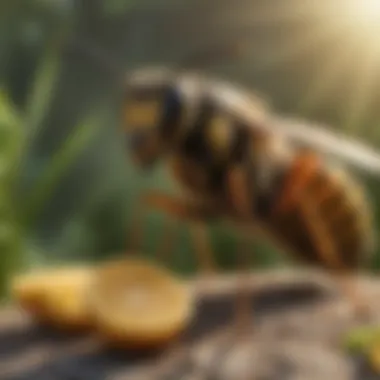
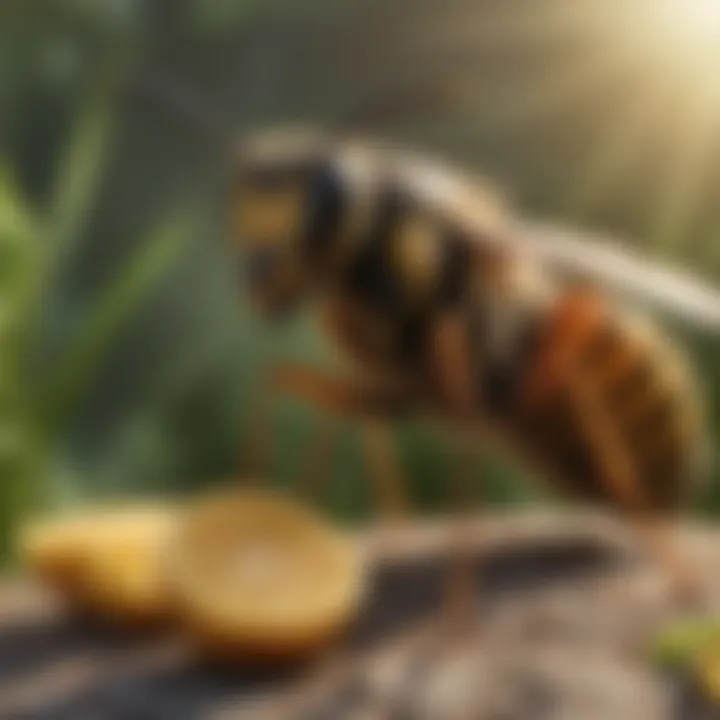
Intro
Every summer, many folks find themselves sharing their outdoor spaces with those pesky wasps. For many households, the sight of a wasp can send people scuttling back indoors. But instead of pure avoidance, what if you could take control of the situation? This article dives into effective strategies for deterring wasps, specifically through natural sprays and techniques that not only keep these insects at bay but also respect the ecosystem.
When it comes to pests, understanding their behavior is key. Wasps play an important role in our ecosystem, acting as natural pest controllers. Still, that doesn’t mean we need to allow them to intrude on our picnics or backyard barbecues. In this guide, we’ll explore various natural remedies, preventative measures, and the broader ecological implications of our pest control choices.
Let’s kick things off by understanding the pests themselves.
Understanding Wasps and Their Behavior
Understanding the behaviors of wasps is crucial when it comes to effective deterrence. Many people mistakenly lump wasps into the same category as bees, which can lead to a misunderstanding of their roles and habits. By delving into the intricate world of wasps, we can develop strategies that not just repel them but do so in a way that maintains harmony in our ecosystems. Knowing how wasps operate can help us arrange our outdoor activities and living spaces to keep these insects at bay while appreciating their contribution to nature.
Overview of Wasp Species
Wasps come in various species, each having its own specific traits and behavioral patterns. Generally, they fall into two categories: solitary wasps and social wasps. Solitary wasps, like the mud dauber, tend to be less aggressive and are primarily focused on hunting and provisioning their nests for their offspring. Social wasps, such as yellowjackets or paper wasps, live in colonies and can be more protective of their territory.
- Yellowjackets: These are often seen at picnics, showing a penchant for sweet foods. They’re notorious for being aggressive when their nest is threatened.
- Paper Wasps: Recognizable by their thin bodies and long legs, they help control pest populations, yet can become pesky themselves if their nests are nearby.
- Hornets: Often larger and more aggressive, they can deliver painful stings but also play a role in the balance of local ecosystems.
Understanding these differences helps homeowners recognize what they might be dealing with, allowing for more tailored deterrent approaches. Knowing the species relevant to your area can also help in recognizing when caution is warranted.
Behavioral Patterns of Wasps
Wasp behavior can seem erratic and unpredictable, yet some patterns emerge when closely observed. For instance, wasps are attracted to protein-rich food sources in late summer as they prepare for their queen’s survival through winter. They naturally gravitate towards waste or leftovers from human gatherings, making outdoor events prime opportunities for unwanted visitors.
Their social structure is fascinating as well. Social wasps exhibit a strong protective instinct toward their nests. If they perceive a threat, they may act quickly and aggressively to defend their colony. Being aware of this protects not just yourself but also minimizes unnecessary confrontations with these insects.
To summarize, to effectively deter wasps, one must understand:
- Their physical characteristics and species-specific behaviors.
- Their attraction to food sources, especially in late summer.
- Their defensive nature towards nests, often leading to aggressive behavior.
"A little knowledge goes a long way. Understand your buzzing neighbors to avoid unwarranted encounters, and you'll both be the better for it."
This understanding sets the groundwork for effectively employing natural sprays and techniques aimed at keeping wasps at bay. But it doesn’t just end here; the insight gleaned from their behavior feeds into the actual strategies homeowners can use to safeguard their living spaces while coexisting with these complex creatures.
Why Repel Wasps?
When it comes to enjoying the great outdoors, wasps can certainly put a damper on your plans. The importance of understanding why we need to repel these insects cannot be overlooked. We often underestimate the potential risks that accompany a relaxing day in the garden or a barbecue party with family and friends. Repelling wasps is not merely about comfort— it's critical for ensuring safety and maintaining the pleasantness of outdoor experiences.
Health Risks Associated with Wasp Stings
Wasp stings are more than just a minor nuisance. For many, they can lead to severe health complications. Here are a few key health risks associated with these stings:
- Allergic Reactions: Some individuals are particularly sensitive to wasp venom and may develop anaphylaxis, which is a severe and potentially life-threatening allergic reaction. It can cause difficulty in breathing, swelling, and even confusion.
- Infections: Even if the sting isn’t serious, there's a chance of infection where the venom has entered the skin. Keeping the area clean is vital, but there’s always that risk.
- Pain and Discomfort: The immediate aftermath of a sting is often marked by sharp pain, swelling, and redness. For many, these symptoms can linger, making simple tasks unbearable.
It’s essential to be aware of these risks, especially if you or someone close to you has a history of allergies. A wasp sting can polarize a delightful summer afternoon into a trip to the emergency room in a heartbeat.
Impact on Outdoor Activities
Wasps can hinder the simple joys of outdoor activities. Picture this: a sunny afternoon, a barbecue sizzling, and laughter filling the air, only to be shattered by the aggressive buzzing of wasps that seem to have decided to crash the party. Their presence can significantly affect not only your enjoyment but also your plans. Some points to consider include:
- Disrupted Gatherings: Social events can quickly turn sour as guests become increasingly wary of the buzzing intruders. No one wants to be the one to take a sting.
- Fear and Anxiety: The mere thought of encountering a wasp can promote discomfort and anxiety, diminishing the enjoyment of outdoor activities. Whether through picnics, gardening, or just lounging on the patio, that fear can cast a shadow on what should be joyful experiences.
- Limited Time Outdoors: People may find themselves retreating indoors or skirting around areas where wasps often abound, leading to missed opportunities for fresh air and sunshine.
Therefore, understanding the importance of repelling wasps is integral for safeguarding not just our health but also our precious outdoor moments.
Natural Ingredients for Wasp Repellents
When it comes to keeping those pesky wasps at bay, turning to natural repellents can be not only effective but also environmentally friendly. The importance of natural ingredients stems from their availability, safety for human use, and generally lower ecological impact compared to synthetic alternatives. Many households prefer these remedies, not just for efficacy but because they align with a more holistic approach to pest management.
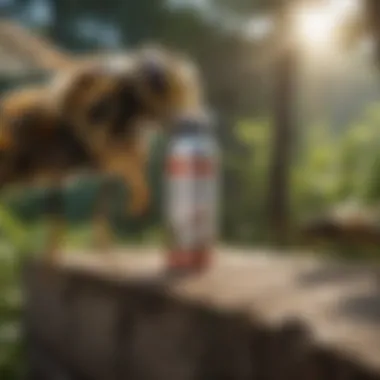
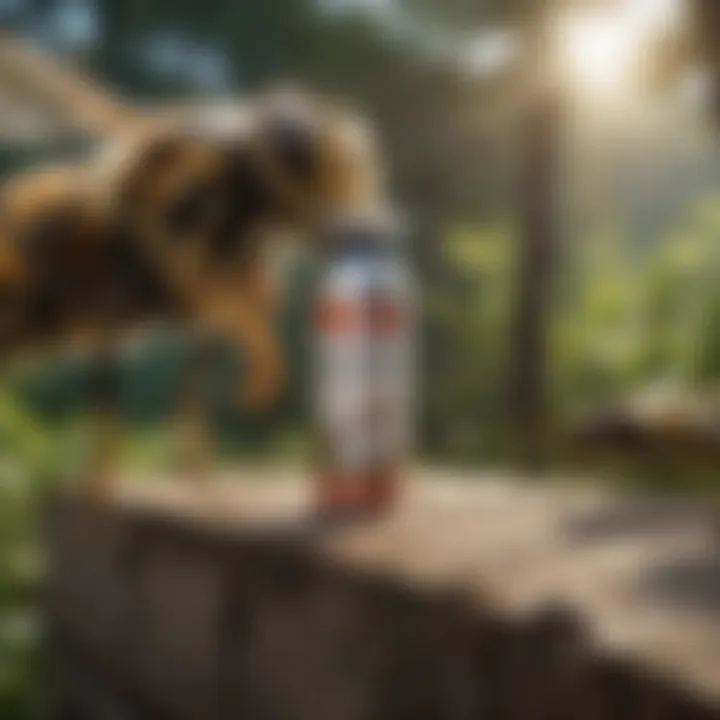
Natural ingredients offer varied benefits such as affordability, ease of crafting at home, and less risk of harming beneficial insects. With the right formulations, one can formulate sprays that are both potent and gentle on the planet. Let's delve deeper into specific constituents that serve as natural deterrents.
Essential Oils as Deterrents
Essential oils are potent extracts derived from plants and can serve as an effective means to ward off wasps. They possess unique aromatic properties that many insects, including wasps, find off-putting. The following oils have made a splash in the realm of natural repellents:
Peppermint Oil
Peppermint Oil stands out for its refreshing scent that many of us enjoy, but its strong aroma is a real kicker for wasps. The key characteristic of peppermint is its intense menthol scent, which not only smells delightful to humans but can make wasps think twice about hanging around. Its volatility means it disperses quickly, making it an excellent addition to any wasp repellent concoction.
A unique feature of Peppermint Oil is its ability to deter various pests, not just wasps. However, one must be cautious since its strong scent can sometimes irritate the respiratory system of some people, particularly those with allergies. Overall, it is a popular choice for natural repellents due to its efficacy and pleasant fragrance.
Lemon Grass Oil
Lemon Grass Oil brings a zesty twist to the table. It contains citral, a compound that has proven useful in repelling insects. This oil is not only effective against wasps, but it also works well on a range of pests, making it a versatile ingredient in the home. The essential oil, with its refreshing and tangy fragrance, creates an unwelcoming environment for wasps, causing them to steer clear of areas treated with it.
The unique feature of Lemon Grass Oil lies in its lower risk of allergy when compared to other oils. It is generally well-tolerated by most people. However, the oil can degrade under sunlight, so it’s essential to apply it when you know the sun isn’t going to be blaring down on it.
Clove Oil
Clove Oil is not only known for its culinary use like in spicing up a dish but also for its pest-repelling qualities. Clove Oil has eugenol as its primary component, giving it a potent scent that wasps dislike. This oil can be particularly effective in certain applications, ensuring that wasps stay far away from your favorite outdoor spaces.
A key characteristic of Clove Oil is its long-lasting scent. It tends to linger longer than many other oils, providing extended protection. But on the flip side, it can be quite strong, potentially leading to headaches for sensitive individuals, making moderation in its use crucial.
Vinegar and Water Mixture
A simple yet powerful combination, mixing vinegar with water is often an underappreciated method for repelling wasps. Vinegar has a strong smell that wasps find unpleasant, acting as an effective deterrent. Mixing equal parts of white vinegar with water and using it in a spray bottle allows you to easily target areas where wasps frequent. This solution should be applied in places where you’ve noticed their activity, creating a barrier that they prefer to avoid.
Citrus Juice Solutions
Drawing on nature's bounty, citrus juices like lemon or orange juice can be effective against wasps. The acidity and fragrance of citrus are not only favored by humans but many insects detest it. Spraying diluted citrus juice not only keeps wasps away but can also freshen up the air. Not just for your drink, citrus can turn into your ally in outdoor spaces.
By employing these natural ingredients, you can create effective wasp repellents that can safeguard your home and outdoor areas while being mindful of the ecological implications. What’s more satisfying than knowing you’re taking on wasps with nature’s own arsenal?
How to Prepare Natural Wasp Sprays
Preparing natural wasp sprays is a cornerstone in effectively managing and deterring these persistent pests. With the current discourse surrounding harmful chemicals, opting for natural sprays not only aligns with healthier living but also addresses ecological concerns. By crafting your own repellent solutions, you gain control over the ingredients and can customize the potency to suit your environment. Understanding how to prepare these sprays is pivotal because it allows you to respond flexibly to wasp activity and maintain a comfortable outdoor space.
Step-by-Step Guide to Making Essential Oil Spray
Creating an essential oil spray is simple and requires just a few ingredients. Essential oils are not just pleasant-smelling; they come with potent insect-repelling properties.
Ingredients:
- 10 drops of peppermint oil
- 10 drops of clove oil
- 1 cup of water
- A spray bottle (preferably glass to avoid any chemical reaction)
Instructions:
- Combine the Oils: In a bowl, mix the peppermint and clove oils. These essential oils not only smell great but are known for their efficacy in keeping wasps at bay.
- Add Water: Slowly add the cup of water to the oil mixture. Stir very gently, ensuring the oils don’t separate right away.
- Transfer to Spray Bottle: Carefully pour the mixture into your spray bottle. A funnel can help with this step, reducing spillage.
- Shake Before Use: Since oil and water do not blend naturally, give the bottle a good shake before each use. This ensures that the solution is consistently mixed.
- Application: Spray it around outdoor eating areas, patios, and gardens, taking care to saturate surfaces well but not to drench them.
This method not only repels wasps but also leaves a fresh scent in the air, providing a better outdoor experience.
Combining Vinegar and Water for Efficacy
Another effective spray option is a simple vinegar and water solution. Vinegar has a strong odor that is unpleasant to wasps, making it a natural deterrent.
Ingredients:
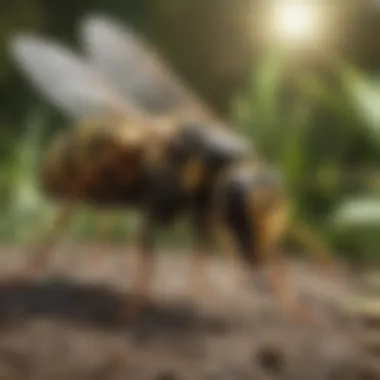
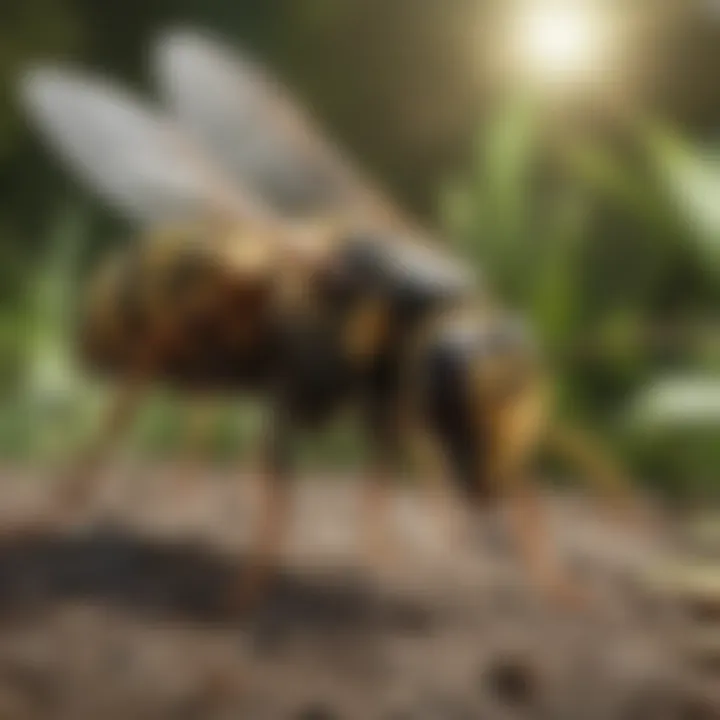
- 1 part vinegar (white vinegar or apple cider vinegar)
- 1 part water
- Optional: 1 tablespoon of dish soap to help the solution stick to surfaces
Instructions:
- Mix Ingredients: In a bowl or directly in your spray bottle, combine equal parts of vinegar and water. If using, add the dish soap and mix thoroughly. The soap helps the solution adhere to surfaces and enhances its effectiveness.
- Transfer to Spray Bottle: If you prepared the mixture in a bowl, pour it into your spray bottle.
- Application: Similar to the essential oil spray, apply it around the areas where you frequently encounter wasps. The scent of vinegar will drive them away without causing harm to other beneficial insects.
This method is particularly useful for those who may be sensitive to fragrances or essential oils, providing a practical solution while being mindful of the environment.
By mastering these preparation techniques, you not only arm yourself with effective deterrents but also foster a greater sense of autonomy in managing your outdoor space.
Application Techniques for Wasp Sprays
Understanding how and where to apply natural wasp sprays is crucial for maximizing their effectiveness. The approach you take can make a significant difference in your success at keeping these insects at bay. Effective application techniques ensure that the sprays are not only used wisely but also target the right spots where wasps tend to congregate. This section will explore the best practices for applying these natural deterrents and the reasoning behind them.
Target Areas for Application
Outdoor Eating Spaces
Outdoor eating spaces often attract wasps looking for food. These areas, whether a patio, deck, or picnic table, are prime locations for wasps to crash your gatherings. Applying natural sprays in these environments can be particularly effective. Key characteristics of outdoor eating spaces include food remnants, sweet beverages, and open-air access, all of which draw wasps in. By spraying around these areas, you can create a less inviting environment for them.
A unique feature of outdoor eating spaces is their social nature; they're often the setting for gatherings. However, because of this, they can also become a hotspot for wasp activity if not treated properly. One disadvantage is that the effectiveness of sprays may diminish if not reapplied after meals, particularly if food spills occur, which could attract wasps again.
Garden Areas
Gardens can be a mixed bag when it comes to wasp attraction. Flowers, fruits, and organic materials attract both good pollinators and pesky wasps. Spraying natural repellents in garden areas can deter wasps from feasting on ripe fruit or nesting in soil. The key characteristic of garden areas is their biodiversity; a variety of plants can either encourage or repel different insects. By focusing on wasp-preferred locations like overripe fruits, you can efficiently apply natural sprays.
Garden spaces also host beneficial insects, so choosing to spray carefully is important. A notable advantage of targeting these areas is that it can help protect fruits and vegetables, offering a dual-purpose solution in pest management. On the flip side, using too much spray can affect other insects, so maintaining balance is key.
Entry Points of Homes
Entry points, such as doors and windows, can sometimes serve as a gateway for wasps into living spaces, especially during warmer months. As wasps can be attracted to the warmth and food scents inside homes, applying sprays around these areas can deter their approach. The characteristic of entry points is that they are often high-traffic areas, meaning wasps may inadvertently find their way inside.
A unique feature of entry points is their accessibility for both humans and insects, making it ideal to apply deterrents without over-saturating the surrounding environment. It’s beneficial to keep wasps at bay before they enter your home, but it’s crucial to ensure that the spray is safe around pets and children if you frequently use these entrances. However, the disadvantage is that inaccurately applied sprays may wash away with rain, requiring more frequent touch-ups to keep them effective.
Timing for Optimal Results
Effective timing plays a significant role in the application of natural sprays. Knowing when to apply can lead to fewer wasp encounters and a more enjoyable outdoor experience.
Early Mornings
Early mornings provide a strategic time for application. During this time, wasps are less active, as the cooler temperatures keep these insects more subdued. Spraying around outdoor eating spaces, garden areas, and entry points during this calm can yield optimal results. The key here lies in the application before wasps become active in the warmer afternoon hours.
Also, a unique feature of early mornings is the lack of distractions; you can apply sprays without concern for immediate disturbances. However, one disadvantage is the potential for dew on surfaces, which can dilute the effectiveness of the spray, meaning careful attention to the formulation used is necessary.
Late Evenings
Late evenings are another choice for applying wasp sprays. As the day winds down, wasps begin to seek a place to settle down for the night, making them easier targets for application. Applying sprays during these hours provides a chance to catch them off guard before they build up their activity again the following day. The key characteristic of late evenings is that many people are less likely to be outdoors, reducing potential disturbances during application.
A unique advantage of this timing is that usually, temperatures drop, which can lessen the aggressiveness of wasps. However, the downside is that visibility might be poorer, making it more challenging to identify areas needing treatment. Additionally, some might be hesitant to spray under these conditions, fearing the night creatures that may also be present.
Choosing the right applications site and timing can significantly enhance your efforts in repelling wasps while safeguarding your outdoor activities.
By strategically applying natural sprays in these recommended areas and at optimal times, you can create an effective barrier against wasps, ensuring a more enjoyable outdoor experience.
Preventative Measures Against Wasps
Preventing wasps from encroaching on your outdoor spaces is a fundamental aspect of maintaining a comfortable environment, especially during those warmer months. Beyond simply relying on natural sprays, tackling the issue from a proactive angle makes for a more effective long-term solution. Removing potential attractants and eliminating nesting locations can significantly reduce the likelihood of wasp invasions. Taking these preventative measures not only protects you and your loved ones but also fosters a more enjoyable outdoor experience.
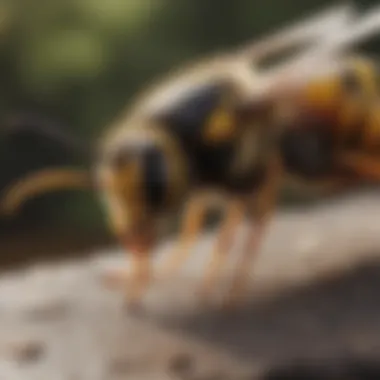
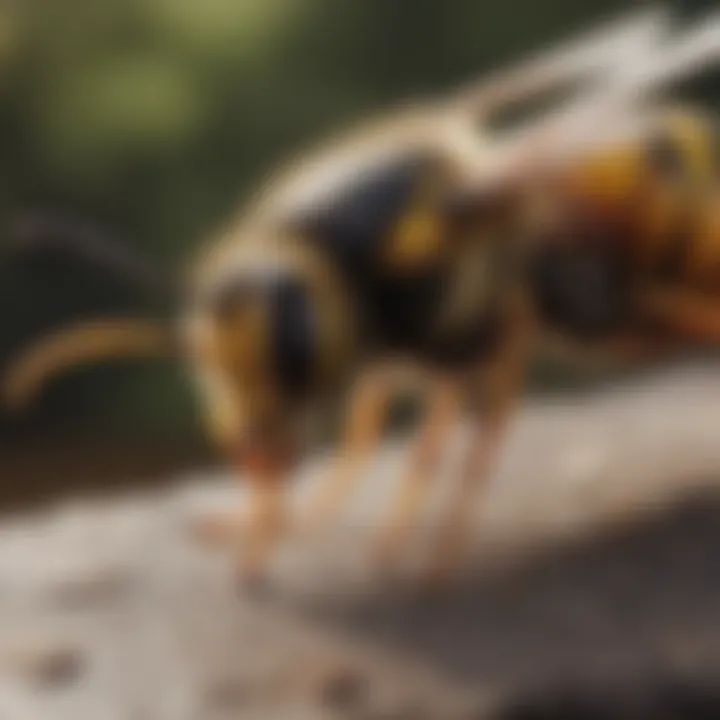
Removing Food Sources
Wasps are notorious scavengers, always on the lookout for food. This innate behavior often leads them to picnic areas, gardens, or any gathering where sweet treats are present. By being vigilant about food sources, you can turn the tide in favor of a wasp-free environment. Here are some strategies to keep in mind:
- Cover Food Items: During outdoor meals, ensure that all food items, especially sweets, are covered until needed. Wasps are drawn to sugary substances, and anything left out can easily attract them.
- Manage Trash Lid: Securely close trash cans and ensure that they are cleaned regularly. Any remnants of food can serve as a beacon for these insects. Whether it’s picnic leftovers or garden waste, keeping your trash in check minimizes their feeding opportunities.
- Opt for Wasp-Repelling Plants: Some gardeners find success in planting herbs such as mint or rosemary in their gardens. The aroma of these plants can deter wasps from approaching the area, ensuring your garden stays peaceful.
These simple actions may seem trivial, but cumulatively they can make a substantial difference in deterring wasps. Just like a penny saved is a penny earned, a little effort in managing food sources goes a long way in avoiding unwanted visits.
Eliminating Nest Locations
Understanding where wasps choose to build their nests is crucial in preventing future encounters. Wasps prefer sheltered areas that provide a bit of protection from the elements. By taking steps to identify and eliminate these nesting spots, homeowners can significantly reduce the chances of wasp presence.
Here are a few pointers on managing potential nest locations:
- Regular Inspections: Check eaves, attics, and sheds regularly for signs of wasp activity. By catching a nest in its early stages, it's easier to remove it before it grows into a bigger issue.
- Seal Entry Points: Inspect your home for cracks, gaps, or openings that might serve as entry points. By sealing these with caulk or other materials, you make it tougher for wasps to take up residence.
- Use Propane or Natural Gas: If you detect a nest and aren't comfortable removing it yourself, consider calling in professionals who might use appropriate measures, such as traps. Sometimes, addressing the problem head-on is necessary.
In the realm of pest management, a proactive approach often reaps greater rewards. By thoughtfully removing food sources and evaluating potential nesting areas, homeowners can enjoy their outdoor spaces with peace of mind.
"An ounce of prevention is worth a pound of cure." This age-old quote rings true when it comes to repelling wasps. Investing time into preventive measures will significantly ease the burden of addressing infestations later.
Ensuring a wasp-free zone requires diligence, but the rewards of a comfortable and inviting outdoor space are certainly worth the effort.
Ecological Considerations
Understanding the ecological aspects of wasps is crucial for anyone looking to address pest control in a balanced manner. While wasps might be seen exclusively as nuisances, they play significant roles in our ecosystems, serving both as pollinators and as natural pest controllers. Recognizing these roles helps us not only to deter them effectively without harming them but also to appreciate their contribution to the environment.
The Role of Wasps in Ecosystems
Wasps are not merely annoying; they are a vital part of many food webs. As predators, they help regulate populations of other insects, including those that can be harmful to gardens and crops. For instance, many wasp species hunt aphids and caterpillars, contributing to the balance of pests in agricultural settings. Their larvae develop in these captured insects, which allows for a natural pest control system that helps maintain a healthy ecosystem.
Moreover, some wasps assist in pollination. While often overshadowed by bees, many wasps visit flowers for nectar. This unintentional pollination supports the reproduction of various plant species, which in turn sustains a plethora of birds and other wildlife. Their diverse roles highlight why we need to tread carefully when managing their populations, ensuring our actions do not disrupt these natural processes.
Balancing Pest Control with Environmental Impact
When it comes to controlling wasp populations, especially around homes and gardens, it’s essential to balance efficacy with environmental responsibility. Using synthetic pesticides might seem like a quick solution, yet these chemicals can leave detrimental effects on non-target species, including beneficial insects like bees.
There are several key considerations to keep in mind:
- Natural Alternatives: As discussed, natural sprays and repellents can be effective and less harmful. Essential oils, vinegar, and citrus solutions can deter wasps without posing risks to other beneficial insects.
- Targeted Approaches: When applying sprays, focus on specific areas rather than general environments. For example, targeting outdoor eating spaces or garden entry points ensures that most of the products will directly impact wasps without affecting other creatures nearby.
- Timing of Treatment: Understanding when wasps are most active allows for more effective control without unnecessary ecological disturbance. Early mornings or late evenings are ideal since wasps are less aggressive at these times.
By strategizing how we manage the wasp populations, we can create a safer environment for ourselves while also preserving the roles that these insects play in nature. Eco-conscious pest management methods will ensure we encourage healthy ecosystems alongside the comfort of our homes.
"Deter without danger, protect without harm."
The End
In wrapping up this comprehensive discussion on effective strategies for deterring wasps, it becomes clear that a balanced approach combines both practical applications and ecological mindfulness. As many homeowners can attest, wasps can transform an idyllic outdoor gathering into chaos, not to mention the potential health risks linked to stings. Therefore, understanding how to repel these insects using natural sprays and preventive measures is paramount.
Summary of Effective Strategies
To summarize, several key strategies can be employed to keep wasps at bay:
- Utilize natural ingredients such as essential oils, vinegar, and citrus juices.
- Create custom repellant sprays tailored to your specific needs, whether by mixing vinegar and water or employing essential oils like peppermint and clove.
- Apply these sprays in targeted areas during key times, notably in early mornings or late evenings when wasps are less active.
- Practice preventative measures by eliminating potential food sources and nest locations, ensuring a less hospitable environment for these insect pests.
Each of these strategies plays a vital role, but their success hinges not just on application but on consistency and a clear understanding of wasp behavior.
Encouraging Non-lethal Approaches
As discussions around pest control continue to evolve, it’s crucial to encourage non-lethal approaches to wasp management. While their presence can be daunting, it's important to recognize that wasps serve important ecological roles, such as pest control and pollination. Instead of opting for harmful pesticides, promoting natural deterrents allows for a more harmonious coexistence with our environment.
Using natural sprays and methods not only aligns with environmentally-friendly practices, it also reduces the risk of harming beneficial insects. Whether it's educating friends and family on these options or sharing experiences within communities on platforms like Reddit or Facebook, the advocacy for humane treatment of creatures like wasps adds a layer of depth to pest management discussions. Moreover, embracing these alternatives enhances the outdoor experience and instills a deeper appreciation for the variety of life inhabiting our surroundings.
Ultimately, combining effective strategies that respect both human space and nature paves the way for a more balanced and sustainable approach to handling wasps.



